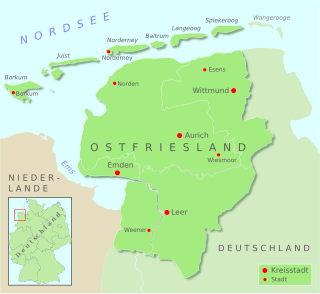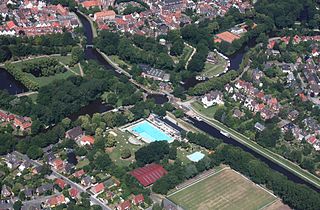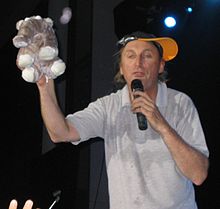
The Frisian languages are a closely related group of West Germanic languages, spoken by about 400,000 Frisian people, who live on the southern fringes of the North Sea in the Netherlands and Germany. The Frisian languages are the closest living language group to the Anglic languages; the two groups make up the Anglo-Frisian languages group and together with the Low German dialects these form the North Sea Germanic languages. However, modern English and Frisian are not mutually intelligible, nor are Frisian languages intelligible among themselves, owing to independent linguistic innovations and language contact with neighboring languages.
The Frisians are an ethnic group indigenous to the coastal regions of the Netherlands, north-western Germany and southern Denmark, and during the Early Middle Ages in the north-western coastal zone of Flanders, Belgium. They inhabit an area known as Frisia and are concentrated in the Dutch provinces of Friesland and Groningen and, in Germany, East Frisia and North Frisia.

Frisia is a cross-border cultural region in Northwestern Europe. Stretching along the Wadden Sea, it encompasses the north of the Netherlands and parts of northwestern Germany. Wider definitions of "Frisia" may include the island of Rem and the other Danish Wadden Sea Islands. The region is traditionally inhabited by the Frisians, a West Germanic ethnic group.

East Frisia or East Friesland is a historic region in modern Lower Saxony, Germany. The modern province is primarily located on the western half of the East Frisian peninsula, to the east of West Frisia and to the west of Landkreis Friesland but is known to have extended much further inland before modern representations of the territory. Administratively, East Frisia consists of the districts Aurich, Leer and Wittmund and the city of Emden. It has a population of approximately 469,000 people and an area of 3,142 square kilometres (1,213 sq mi).

Emden is an independent city and seaport in Lower Saxony in the northwest of Germany, on the river Ems. It is the main city of the region of East Frisia and, in 2011, had a total population of 51,528.

Saterland Frisian, also known as Sater Frisian, Saterfrisian or Saterlandic, spoken in the Saterland municipality of Lower Saxony in Germany, is the last living dialect of the East Frisian language. It is closely related to the other Frisian languages: North Frisian, spoken in Germany as well, and West Frisian, spoken in the Dutch province of Friesland.

Otto Gerhard Waalkes, also known as simply Otto, is a German comedian, actor, musician, writer, and comic book artist. He became famous in the 1970s and 1980s in Germany with his shows, books and films. His best known trademark are the 'Ottifanten' ('Ottiphants'), elephant-like comic characters of his own design. They featured on the cover of his first album release.

North Frisia is the northernmost portion of Frisia, located in Schleswig-Holstein, Germany, between the rivers Eider and Wiedau. It also includes the North Frisian Islands and Heligoland. The region is traditionally inhabited by the North Frisians.
German humour is the conventions of comedy and its cultural meaning within the country of Germany. German humour encompasses traditions such as Kabarett and other forms of satire as well as more recent trends such as TV shows and stand-up comedy.
Frisian Americans are Americans with full or partial Frisian ancestry.
The term Lübke English refers to nonsensical English created by literal word-by-word translation of German phrases, disregarding differences between the languages in syntax and meaning.

Pilsum Lighthouse was built in 1891 as a sector light for the Emshörn channel on Germany's North Sea coast. It is located on a dyke near the village of Pilsum in the municipality of Krummhörn. It guided ships through the narrow channel until 1915. During the First World War, its light was extinguished so that enemy ships could not navigate the route. After that, it was no longer needed, because the channel was changed. The height of the structure is 11 metres; the height of the light about sea level is 15 metres. Today, the tower is one of the best-known symbols of East Frisia.

Otto – Der Film is a West German comedy film from 1985, starring Otto Waalkes. With 14.5 million sold tickets it is among the most successful German movies.

Eggerik Beninga (1490–1562), also known as Eggeric(k) Benninga or Benynga, was an East Frisian chronicler and steward of the Leerort Fortress. From 1540 to 1556 he was also counselor to Anna of Oldenburg. He wrote an account of the history of the Frisians until the year 1562 A.D.

The East Frisian Report is a 1973 German sex comedy and road film directed by Walter Boos.
Little rabbit jokes (Häschenwitze) were a type of joke that became popular in the 1970s, first in East Germany and later in West Germany. The little rabbit joke first emerged in East Germany in the early 1970s as a politically subversive joke. In West Germany, little rabbit jokes were hardly ever considered anything more than corny.

"Friesenjung" is a 2023 song by German comedian and musician Otto Waalkes and a parody of Sting's "Englishman in New York", in which Frisian life is highlighted.














